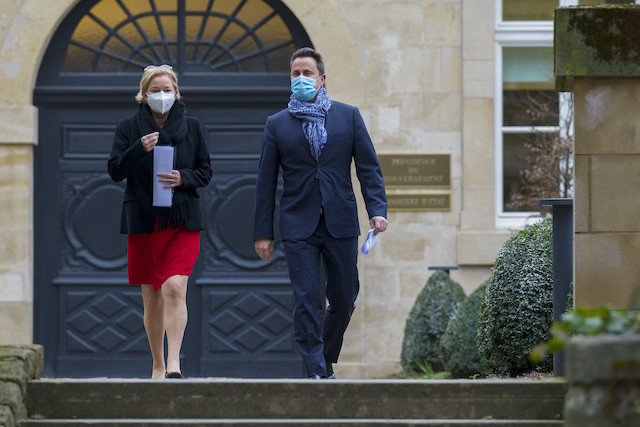The “Sonndesfro”, commissioned by RTL and the Luxemburger Wort, surveyed voters between 9 and 21 June on how they would vote if elections were held next Sunday.
Despite health minister Paulette Lenert coming out on top of an approval rating published earlier in June, her party--the LSAP--lost 2% in support by voters between November 2020 and June 2021, the biggest drop together with the ADR, who would go from 9.6% of votes to 7.6% if elections were held now.
The DP, too, would lose 0.6% of votes compared to November 2020 if elections had been held in June. The Green coalition partner, however, would gain 1.9%. This even though déi Gréng politicians scored low in the approval rating.
The DP-LSAP-déi Gréng coalition would be able to remain in government with a majority of 32 seats out of 60 seats in the Chamber of Deputies, with the grand duchy living up to its reputation of favouring a stable political landscape.
The coalition currently holds 31 seats. According to the survey, the LSAP and DP would each gain one mandate with the Greens losing one.
Pandemic boost
Taking a longer-term look, the picture changes somewhat. Looking at the last pre-pandemic survey in November 2019, the LSAP gained 2.8% in support by voters in the June 2021 poll. The DP gained 2.7% over the same time, with Lenert and prime minister Xavier Bettel the faces of crisis management. Déi Gréng lost 2.5%.
Among the opposition parties represented in parliament, the Pirate Party fared best, increasing support by 2.6% from the pre-pandemic poll, followed by left-wing party déi Lénk (+1.5%). The ADR lost 2.8% in support by voters in the survey between November 2019 and June 2021.
The CSV, however, is the biggest loser, dropping 5.5% in the survey.
Pirate party gains
The gains by the Pirate Party would translate into two additional seats in parliament, doubling its presence from two mandates, currently held by Sven Clement and Marc Goergen.
This comes after Clement entered the top ten of the June approval poll, gaining 11 points, the biggest jump of any politician.
Clement over the past months campaigned for more government transparency, for example in how it manages agreements with private companies like Google. He also spearheaded an effort to investigate whether vaccine queue jumpers broke the law.
Scandal-hit CSV
The CSV in the June 2021 edition of the “Sonndesfro” would secure just 17 seats in parliament, losing four mandates compared to its actual result in the October 2018 elections.
This comes after a party leadership crisis at the start of this year.
CSV president Frank Engel in March stepped down from his post. He potentially faces trial over a labour contract with a not-for-profit affiliated with the CSV--the CSV Frëndeskrees--which owns the party headquarters.
Party members had forwarded the matter to the public prosecutor’s office over suspected misuse of assets. A public hearing later this year is set to determine whether the case proceeds to trial, the public prosecutor said on 15 June.
Claude Wiseler--who succeeded Engel after a party ballot in April--in an interview for Delano’s June edition said he would expect the party to fare poorly if elections were held now. “My goal is to get these numbers up,” he said.
While in November last year, the party received a score of 0.1 on how highly voters think of the work it does (on a scale of +5, thinking very highly, to -5), this dropped to -0.1 in the June survey.
The Pirate Party’s score improved from -0.6 to -0.1, tying with the CSV. The government as a whole maintained a stable rating, at 1.4 (down from 1.5 six months ago).
